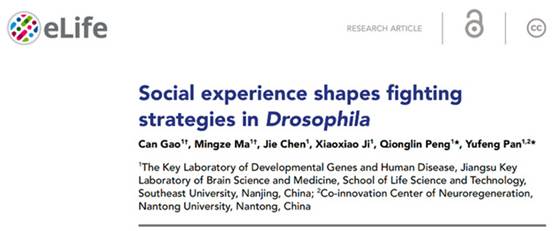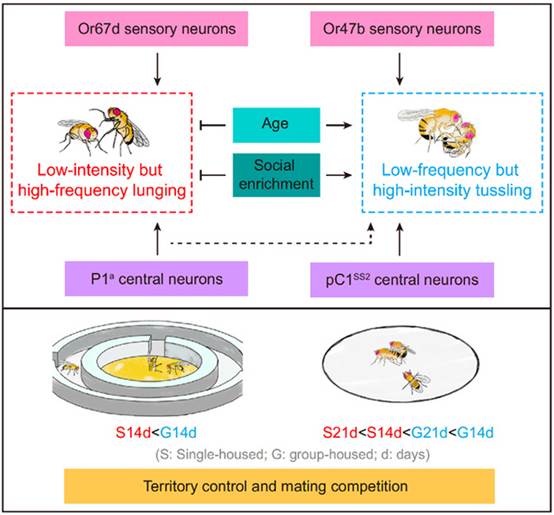On October 7, 2025, a research team led by Professor Pan Yufeng from the School of Life Science and Technology and College of first-year students at Southeast University published a research paper titled "Social experience shapes fighting strategies in Drosophila" in the academic journal eLife. This study reveals how social experience shapes different types of aggressive strategies in male Drosophila through specific olfactory receptors and central neurons, thereby influencing territorial control and mating competition advantages. This discovery provides a new neurobiological mechanism for understanding how social experiences influence aggressive strategies in animals.

Aggressive behavior is a crucial means for animals to compete for survival and reproductive resources. Previous research has primarily focused on the high-frequency, low-intensity "lunging" behavior in Drosophila, while knowledge about the more intense "tussling" behavior has been limited. By establishing a new aggressive behavior paradigm, the research team systematically investigated the regulatory mechanisms of tussling behavior for the first time. They found that group-reared male flies exhibited a significant reduction in "lunging" behavior and a notable increase in "tussling" behavior, demonstrating a strategic shift from low-intensity to high-intensity aggressive modes.
Further research revealed that this social experience-induced tussling behavior depends on the activity of olfactory receptor neuron Or47b, whereas the traditional "lunging" behavior relies on the Or67d neuron, which detects male pheromones. Additionally, the team identified three pairs of pC1SS2 neurons in the central nervous system that specifically promote male tussling behavior, distinct from the previously known P1a neurons that regulate both courtship and aggression (Figure 1). Optogenetic experiments showed that activating pC1SS2 neurons immediately induced intense tussling behavior, while inhibiting these neurons or the Or47b neurons significantly reduced male flies' territorial control and mating success. In summary, this study elucidates how social experience reshapes aggressive strategies in Drosophila through the Or47b and pC1SS2 neural pathways, providing a new neurobiological framework for understanding the relationship between social experience, aggressive behavior, and reproductive competition.

Figure 1: A summary model of male Drosophila aggressive strategies and reproductive success
Postdoctoral researcher Gao Can and Ph.D. student Ma Mingze from the School of Life Science and Technology at Southeast University are co-first authors of the paper. Professor Pan Yufeng and Associate Researcher Peng Qionglin from Southeast University are co-corresponding authors. This work was supported by the National Key R&D Program of China and the National Natural Science Foundation of China. (School of Life Science and Technology)
Link to the original article: https://elifesciences.org/articles/104212
